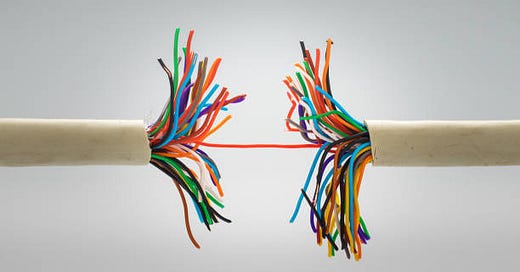There's a gap beyond just a space!
Often enough we build bridges with technology, but rarely with our humanity. Our lives are bridges, but we must find where to anchor them.
Dear Dreamer,
I have been thinking about bridges lately, the invisible ones that shape our world. We often talk about progress in terms of innovation, scaling products, and democratizing access to technology.
We celebrate how quickly a startup can change an industry, how a single breakthrough can disrupt an entire system. And yet, when it comes to bridging human lives, lifting people across the gaps of inequality, injustice, and lost opportunity, we sometimes hesitate.
We wait for governments, organizations, or "extraordinary" individuals to step in. But what if the real progress we need is not just about technology, but about the way we choose to show up for one another?
The world doesn't change from a distance. It changes when we step into the in-between and become the bridge that gives others a chance to belong - Tunde Onakoya
I have been thinking a lot about what it means to truly step in to be present, to be intentional, to take responsibility for the gaps in our world; because evidently there are so many gaps.
Tunde Onakoya embodies this deeply. Through Chess in Slums Africa, he has taken what many see as just a game and turned it into a tool for rewriting destinies. In communities where poverty dictates the limits of a child's future, he has introduced a new kind of script; one where intelligence, strategy, and resilience can become tickets to a life far beyond what was once imagined.
Just recently, five children from the slums of Nigeria, who once knew nothing about chess, found themselves competing on the world stage. Tunde shared their journey, and it is nothing short of breathtaking.
We often admire stories like this from afar, calling them extraordinary. And they are. But beyond the admiration lies a deeper truth: the gap is more than just a space; it is a calling. We live in a world full of gaps (gaps in education, access, justice, and opportunity).
And yet, too many times, we stand at the edges, hoping someone else will step in. It is easier that way, to believe that change belongs to people like Tunde, the ones who defy the odds.
But the reality is, every one of us is standing at the edge of a gap. And the bridges we build through our choices, our actions, and our willingness to care; determine whether others get to the other side.
The question is never whether the gap exists. It does.
The real question is: will we step forward?
John Ehrenfeld once wrote that true change requires a shift in how we think. Too often, we react to problems instead of understanding them. We praise outliers instead of fixing the system that made their work necessary in the first place. Tunde's work is heroic, but it shouldn't take individual sacrifice to give children a fair chance.
As Charles Isidi rightly said, "We need to institutionalize kindness, and we can’t do it by relying on Tunde. This is the job of the Ministry of Education. Our children are intelligent, we just have an insidious government robbing them of their future."
And I couldn't agree more. What Tunde is doing is remarkable. But what happens when the lone bridge builders are exhausted? When they can no longer carry the weight alone? The work must outlive the individual. The system must change. Policies must shift. Structures must be rebuilt.
Bridges are not meant to be built alone. If Tunde has shown us anything, it is that when one person steps forward, others follow. If one man can do this much, imagine what an entire community, an entire movement, an entire system could do.
The gap is here. The only thing left is to decide what we will do about it.
With urgency,
Mustapha




Very thoughtful piece